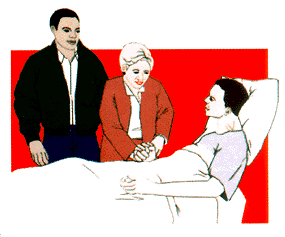|
En Español
You are caring for a person, not just a body; their feelings are important too. Since every person is different, there are no rules about what to do or say, but here are some ideas that may help.
- Keep them involved in their care. Don't do everything for them or make all their decisions. Nobody likes feeling helpless.

- Have them help out around the house if they can. Everybody
likes to feel useful. They want to be part of the group, contributing what they can.
- Include them in the household. Make them part of normal talk about books, TV shows, music, what is going on in the world, and so on. Many people will want to feel involved in the things that are happening around them. But you don't always have to talk, just being there is sometimes enough. Just watching TV together or sitting and reading in the same room is often comforting.
- Talk about things. Sometime they may need to talk about AIDS
or talk through their own situation as a way to think out
loud. Having AIDS can make a person angry, frustrated, depressed, scared, and lonely, just like any other serious illness. Listening, trying to understand, showing you care, and helping them work through their emotions is a big part of home care. A support group of other people with AIDS can also be a good place for them to talk things out. Contact the National Association of People with AIDS for information about support groups in your area. If they want professional counseling, help them get it.
- Invite their friends over to visit. A little socializing can
be good for everyone.
- Touch them. Hug them, kiss them, pat them, hold their hands
to show that you care. Some people may not want physical closeness, but if they do, touch is a powerful way of saying you care.
- Get out together. If they are able, go to social events, shopping, riding around, walking around the block, or just into the park, yard, or porch to sit in the sun and breath fresh air.
|